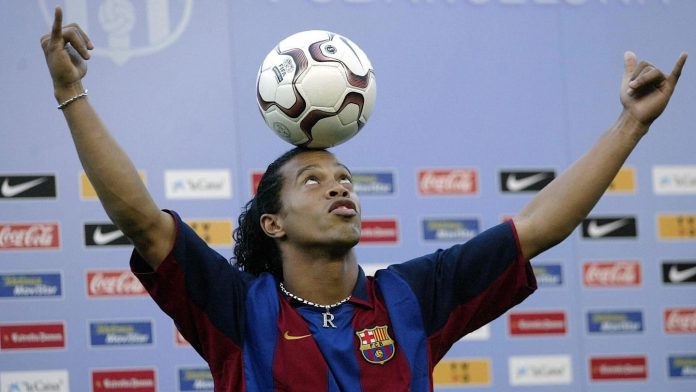Former Manchester United chief executive Peter Kenyon has shed more light on why the club failed to sign Ronaldinho in the summer of 2003, and the Brazilian star joined Barcelona.
United were eyeing a marquee signing after allowing David Beckham to join Real Madrid, but the circumstances surrounding the then England captain’s departure may also have helped change the club’s mind on the idea of recruiting Ronaldinho in his place.
It had previously been understood that Barcelona could have offered more money and that Ronaldinho had just changed his mind. But Kenyon has offered a new angle, suggesting United also began to see red flags during the process of agreeing a deal.
talking Presents Rio Ferdinandthe new name of VIBE with FiveKenyon denied there was any truth to claims United lowered their bid after agreeing a fee with Paris Saint-Germain and pointed to how many people Ronaldinho had in his entourage, as well as other concerns.
“Usually in these cases you’re dealing with the player and his agent. Here we’re dealing with the player, several agents and about 20 other people in the room. He’s a great player, but suddenly we’re in a completely different Kenyon explained.
“Injecting this kind of culture around training, usually not on time, which is different. The Brazilian health culture, different. A fantastic player, but there are a lot of other things that started to creep into everything that, and it clearly came with a load of people.
“You know what united it was like at that time. It was an institution, no one was treated differently from the rest. This started to be a bigger problem than money. We reached an agreement with the club, we reached an agreement with the player, but we came back and said: “Ultimately, I don’t think this is (right)”. David (Beckham) had just moved in and some of that noise was around the environment.”
Beckham’s star had risen so high at that point in his career that he was increasingly clashing with Sir Alex Ferguson, which eventually led to the player’s departure, so it’s understandable why he would sign a player who had the potential to not fit perfectly into the environment could become a concern.
When David Gill, who succeeded Kenyon as chief executive later in 2003 but had already been chief financial officer and deputy general manager, also discussed the issue with Rio Ferdinand in early 2024, he further emphasized that the Ronaldinho’s personal choice was the key factor.
“I haven’t had a good vibe,” he said. “I just heard yes Barcelona if we hadn’t been there, we would have taken it. But if Barcelona were there, he was clearly their first choice, a Brazilian who was going to Barcelona.
“With all due respect, despite Manchester United’s success, they were their first choice. If they hadn’t come with the goods, we would have had the whole deal done. The numbers were done. I don’t think it was anything we had done wrong, only that Barcelona had entered”.
United’s final consolation for not getting Ronaldinho was the cheaper capture of an 18-year-old unknown named Cristiano Ronaldo for £12.24m.


